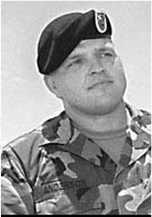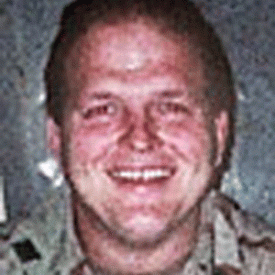Remembering Rangers Who Have Made the Ultimate Sacrifice

75th Ranger Regiment
Information and Sentiments
Bio
Hundreds mourn Marc A. Anderson
By Bob Dyer
Beacon Journal staff writer
BUSHNELL, Fla. – Although Florida National Cemetery opened only 14 years ago, it is already the final resting place for 124 people named Anderson.
The one from Alliance makes 125.
Marc A. Anderson, 30, is not the youngest of the Andersons buried here, nor the oldest. Some of them passed peacefully as old men or women. Others died long before their time.
But among those who went prematurely, perhaps no other death seemed so right.
Now, that may sound like a very odd thing to say, given the fact that Marc Anderson was, by all accounts, young, bright, healthy, athletic and selfless. But you simply had to be here.
You had to be here to look into the eyes of his father, David, 62, as he showed off his son’s Bronze Star outside a St. Petersburg funeral home under a green canopy created by huge, twisting white oak trees.
You had to know Marc’s father was a career military man, an Army Ranger himself, a three-tour Vietnam vet with three Purple Hearts and a Bronze Star of his own.
You had to be standing next to his father outside a St. Petersburg church, six months to the hour after hijackers slaughtered thousands of innocent American civilians, and hear him say that he sent word to President Bush that the fight against terrorism must continue to the end.
You had to hear Marc Anderson’s father say that his son gave his life in a righteous fight against exactly the kind of evil that the Andersons — and millions of other families through 226 years of American history — have been willing to risk everything to stop.
You had to hear the elder Anderson talk about how Marc’s Bronze Star included what the Army calls “a V device,” a tiny bronze V on the ribbon, representing valor.
The V also signifies that Marc Anderson fulfilled his promise to outdo the old man. David Anderson’s Bronze Star did not come with a V device.
You needed to feel the strength in the handshake of John Anderson, 35, Marc’s older brother, the one standing ramrod straight in the uniform of the U.S. Marines, the one who also graduated from Alliance High, the one who tells you, “My brother died for the freedom and liberties (we) have. I’m so proud. So proud.”
You had to witness the gritty spirit of Marc’s other brother, Steve, 37, yet another Army vet, yet another Alliance High grad, this one fighting colon cancer. While not yet declared in remission, he recently improved dramatically — news he was able to share by telephone with his brother shortly before Marc died. Marc was so happy, he cried.
You had to hear the laughter in the parking lots coming through the tears. You had to hear the stories, like the one about how Marc liked his steak so rare that he’d tell the cook, “Just slap the cow on the butt and I’ll slice off a piece as it walks by.”
You had to see the parade of people from all over the country who poured into the Tampa Bay area to pay their respects to one of six Americans killed by the Taliban when they tried to rescue a Navy Seal who had fallen from a helicopter.
There were fraternity brothers from Case Western Reserve University in Cleveland, which Marc attended for a year before moving to Florida.
Teammates from Florida State University in Tallahassee, where he was an All-American in the shot put and, as a senior, was named the top male student-athlete in the school.
Former students from Marc’s three years as a math teacher at Fort Myers (Fla.) Middle School, young people who drove two hours to get here, students who not long ago were seventh-graders who despised math.
“I went into middle school hating it, and came out loving it,” said Lindsey Pierce, 17, bestowing on Marc the equivalent of a teacher’s Bronze Star.
Even his old school bus driver — Marilyn Bossart of Alliance, now retired — was here. She was 90 minutes up the coast, visiting friends, when she heard the news, and immediately elected to make the journey because of her vivid memories of what a “great kid” Marc Anderson was.
You had to sit in the Spanish mission-style church, a one-story structure with beige stucco walls and a red tile roof, adjacent to a wide canal, with squatty palm trees in front, and hear the trio of eulogies delivered in a building where Marc once taught Sunday school.
First, the sister-in-law, Wendy Anderson, who talked about the guy she jokingly called “my baby brother,” the 6-foot-3, 280-pound monster who was always smiling, a smile so powerful it once calmed the seemingly uncontrollable shrieks of her 4-week-old baby.
The former teaching buddy, David Childress, who called Marc “a hero in the classroom,” a guy who routinely stopped for bagels and orange juice for the kids he met with before school, kids who needed extra help.
The former Ranger roommate, Russell Zayas, a black man in a sea of white people, who sobbingly told the 500 mourners that he simply couldn’t have made it through Ranger training without his buddy’s support. He said Marc lived and died by the Ranger creed, particularly “the most important and most compassionate part: Never leave a fallen comrade.”
You had to see the immense pride that dried her tears when Marc’s mother, Judith, wrapped her arm around her husband’s waist for the recessional, raised her eyes from the floor and walked steadily down the long aisle singing America the Beautiful.
Most of all, you had to see the cemetery, 527 acres of gently rolling hills under a high blue sky in western Florida.
The service was held atop the highest of those hills inside a roofless concrete oval, surrounded by firs and deciduous trees in their full glory. Terraced sidewalks crossed the front of the hill, which dropped to a semicircle of 50 state flags. In the distance, beyond the flags, were row upon row of identical headstones, aligned with precision, marking the spots of some of the other 45,751 vets here.
Fellow Rangers punctuated the ceremony with a 21-gun salute, seven of them firing three shots each — one for honor, one for courage, one for country.
TV news helicopters that had followed the nearly two-hour journey from the church to the cemetery departed before the ceremony began, aware that their noise would interfere. They left behind the singing of birds and the rustling of trees. The temperature was 78 degrees.
Burly Rangers strained under the weight of the 190-pound casket and Marc’s body. Not much of Marc Anderson was fat. He was 6-foot-3, with a 35-inch waist, a body honed by a Ranger regimen that spits out the vast majority of candidates.
Marc Anderson didn’t set out to be a Ranger. He just wanted to teach. But his teacher’s salary wasn’t big enough to pay off the college loans he ran up at CWRU and FSU. He knew the Army would pick up his tab if he gave three years.
But if he was going to do something, he wasn’t going to do it halfway. How do you think he got to be a 4.0 student? How do you think he got to be a star wrestler and football player and set records at Alliance High in the shot put? How do you think he turned into the kind of teacher who would so move his students that they’d cry at his funeral?
Did anyone ever doubt he’d make the Rangers, one of only 40 in his class of 214? Of course, he’d make it.
His father was out of the Army by then, retired after 21 years. At first he worked for Babcock & Wilcox in Alliance, then was lured to Jacksonville, Fla., by warmer weather and an offer from Adelphia Business Solutions, where he works in telecommunications.
But his dad knew exactly what Marc was getting into. His crucible was the rice paddies of Vietnam. His son met his test in the snow-whipped mountains of Afghanistan, near the Pakistan border.
The father is a rock. For days he has met every media request with grace, answering in detail, determined to spread the word about the goodness of his son. Marc’s mother, the former Judith Wahl, a member of the first four-year class at Marlington High School, wasn’t quite as composed.
But the rock has his moments, too. His usually come soon after he rises at 4 a.m. — a residual of his military career — and goes outside with a cup of coffee.
It’s never really right, of course, a premature death. People aren’t supposed to die at age 30.
But then David Anderson thinks about the camaraderie — no, the love — between his son and the 45 or so Rangers who showed up to honor his memory, the ones who secretly placed a bottle of Jim Beam in the casket during calling hours, then fished it out later for delivery to the Ranger bar in Savannah, Ga.
David Anderson thinks about the kind of commitment and dedication and loyalty that you need to be a Ranger, and he knows you just don’t see that kind of thing every day.
Maybe not once in a lifetime.


